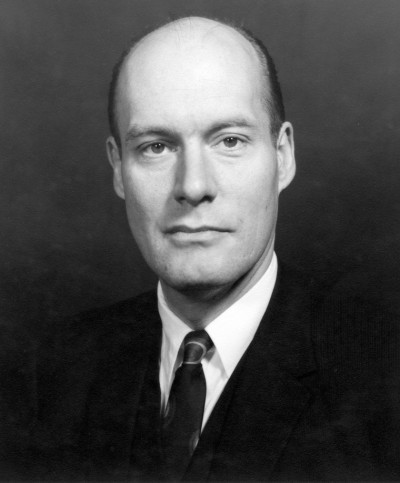Nicholas Katzenbach (Nicholas Katzenbach)

Katzenbach was born in Philadelphia and raised in Trenton. His parents were Edward L. Katzenbach, who served as Attorney General of New Jersey, and Marie Hilson Katzenbach, who was the first female president of the New Jersey State Board of Education. His uncle, Frank S. Katzenbach, served as mayor of Trenton and as a Justice of the New Jersey Supreme Court. He was named after his mother’s great-great-grandfather, Nicholas de Belleville (1753–1831), a French physician who accompanied Kazimierz Pułaski to America and settled in Trenton in 1778. Katzenbach was raised an Episcopalian, and was of part German descent.
Katzenbach served in the United States Army Air Corps in World War II. Assigned as a navigator in the 381st Bomb Squadron, 310th Bomb Group in North Africa. His B-25 Mitchell Bomber was shot down February 23, 1943, over the Mediterranean Sea off North Africa. He spent over two years as a prisoner of war in Italian and German POW camps. Katzenbach attended Phillips Exeter Academy, received his B.A. cum laude from Princeton University in 1945 and his LL.B. cum laude from Yale Law School in 1947, where he served as Articles Editor of the Yale Law Journal. From 1947 to 1949, he was a Rhodes Scholar at Balliol College, Oxford.
On June 8, 1946 Katzenbach married Lydia King Phelps Stokes, in a ceremony officiated by her uncle, Anson Phelps Stokes, former canon of the Washington National Cathedral. Her father was Harold Phelps Stokes, a newspaper correspondent and secretary to Herbert Hoover. Katzenbach was admitted to the New Jersey bar in 1950 and the Connecticut bar in 1955. He was an associate in the law firm of Katzenbach, Gildea and Rudner in 1950.
From 1950 to 1952 he was attorney-advisor in the Office of General Counsel to the Secretary of the Air Force. Katzenbach was on the faculty of Rutgers School of Law—Newark from 1950 to 1951; was an associate professor of law at Yale from 1952 to 1956; and was a professor of law at the University of Chicago from 1956 to 1960. He served in the U.S. Department of Justice as Assistant Attorney General of the Office of Legal Counsel in 1961-1962 and as Deputy Attorney General from 1962 to 1965. President Johnson appointed Katzenbach the 65th Attorney General of the United States on February 11, 1965, and he held the office until October 2, 1966. He then served as Under Secretary of State from 1966 to 1969. In September 2008 Katzenbach published Some of It Was Fun: Working with RFK and LBJ (W. W. Norton), a memoir of his years in Government service.
On June 11, 1963 Katzenbach was a primary participant in one of the most famous incidents of the Civil Rights struggle. Alabama Governor George Wallace stood in front of Foster Auditorium at the University of Alabama in an attempt to stop desegregation of that institution by the enrollment of two black students, Vivian Malone and James Hood. This became known as the “Stand in the Schoolhouse Door.” Wallace stood aside only after being confronted by Katzenbach, accompanied by federal marshals and the Alabama National Guard.
Katzenbach left government service to work for IBM in 1969, where he served as general counsel during the lengthy antitrust case filed by the Department of Justice seeking the break-up of IBM. He and Cravath, Swaine & Moore attorney Thomas Barr led the case for the computer giant for 13 years until the government finally decided to drop it in 1982. Later Katzenbach led the opposition against the case filed by the European Economic Community. He retired from IBM in 1986 and became a partner at the firm of Riker, Danzig, Scherer, Hyland & Perretti in New Jersey. He was named chairman of the failing Bank of Credit and Commerce International (BCCI) in 1991.
In 1980 Katzenbach testified in the United States District Court for the District of Columbia for the defense of W. Mark Felt, later revealed to be the “Deep Throat” of the Watergate scandal and later Deputy Director of the FBI; accused and later found guilty of ordering illegal wiretaps on American citizens. In December 1996, Katzenbach was one of New Jersey’s fifteen members of the Electoral College, who cast their votes for the Clinton/Gore ticket. Katzenbach also testified on behalf of President Clinton on December 8, 1998, before the House Judiciary Committee hearing, considering whether to impeach President Clinton.
On March 16, 2004, MCI Communications in a press release announced “its Board of Directors has elected former U.S. Attorney General Nicholas Katzenbach as non-executive Chairman of the Board, effective upon MCI’s emergence from Chapter 11 protection. Katzenbach has been an MCI Board member since July 2002.” MCI later merged with Verizon. Katzenbach and his wife Lydia retired to Princeton, New Jersey, with a summer home on Martha’s Vineyard in West Tisbury, Massachusetts. His son is writer John Katzenbach. His daughter Maria Katzenbach is also a published novelist. Katzenbach died on May 8, 2012. He was 90.
Born
- January, 17, 1922
- USA
- Philadelphia, Pennsylvania
Died
- May, 08, 2012
- USA
- Skillman, New Jersey


